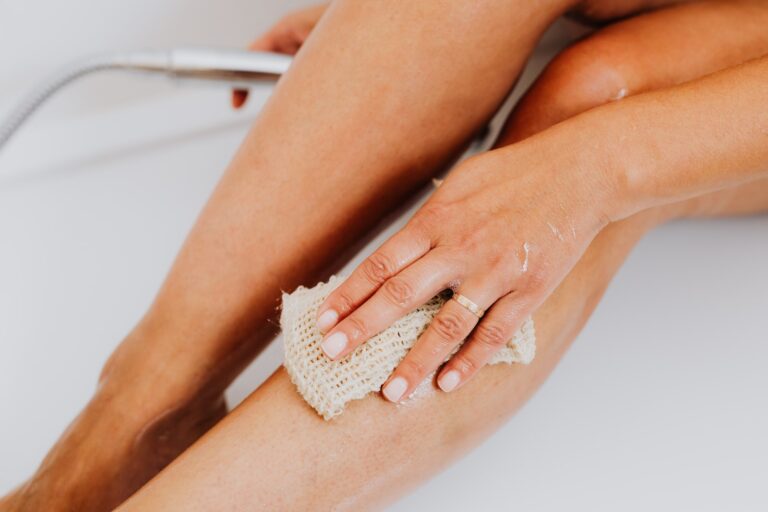Vulva exfoliation is scrubbing the part of the body that contains hair. This includes the vulva, bikini line, outer labia, and pubic mound. It’s also important to exfoliate the vulva before waxing it.
It’s important to use a gentle exfoliant when scrubbing the vulva, as it can be very thin and sensitive. It’s also important to avoid using scented soaps, as these can upset the natural pH balance of the area.
Use a gentle exfoliator
Vagina exfoliation removes dead skin and helps prevent ingrown hairs and abrasions. It also helps the skin absorb intimate washes and other products more effectively. It also improves the skin’s elasticity, making it less prone to stretch marks.
To exfoliate your vulva, gently scrub the area with a washcloth or loofah in a circular motion – This section is the product of the website’s editorial analysis teen-super-sexy.com. Then, apply a gentle exfoliator and massage it in a gentle way. After scrubbing, rinse the area with water and dry it with a towel. Then, use a moisturizer to keep the skin hydrated.
While it is important to exfoliate your vulva, it’s also important not to overdo it. The vagina is a self-cleaning organ and shouldn’t be exposed to harsh exfoliants or scrubs. It is best to exfoliate the vulva once or twice a week. It is also important to clean the vulva with a natural product, such as a sugar scrub or intimate wash. You can also make a scrub at home by mixing a cup of brown sugar with a half cup of coconut oil or jojoba oil.
Use a body exfoliant
The skin of the vulva is delicate, so body exfoliants should only be used on this area with caution. However, it’s important to exfoliate this area regularly, as it can help prevent ingrown hairs and other irritants. A simple exfoliation routine of using a scrub or dry brush can help keep this area healthy and clean.
Vaginal exfoliation is also a good idea before and after a hair removal procedure. This can help reduce the risk of ingrown hairs, bumps, and rashes caused by waxing or shaving. Moreover, it can also help you get a smooth and supple touch post-treatment.
A good body exfoliant to use on the vulva includes products that are gentle and designed for sensitive skin. These should also be free of fragrances and other irritants. It’s also a good idea to apply moisturizer after scrubbing your vulva. This will keep the skin hydrated and prevent it from becoming dry. Additionally, it will also make the hair easier to remove.
Use a homemade exfoliator
The vulva is a sensitive part of the body, and it requires special care. It is important to exfoliate the area once or twice a week to keep it clean and healthy. You can use a scrub or a sugar-based exfoliator to get rid of dead skin cells and prevent ingrown hairs. You can also use a natural oil to moisturize the area.
It is recommended that you exfoliate your vulva before and after a hair removal procedure, such as waxing or shaving. This will help prevent ingrown hairs and rash. It will also allow the hair to grow back smoother. You can make a homemade scrub with sugar and coconut oil. It is easy to use and will not irritate the sensitive skin in your intimate area.
Vulva exfoliation is important to remove dead skin cells in the area surrounding your labia (the fleshy inner lips of the vagina). This can cause discomfort, rashes and yeast infections. A gentle exfoliant can keep the skin down there soft and supple, and it can even prevent odor.
Use a scrub
Keeping your intimate area clean is one of the best things you can do to keep it healthy. This will remove the buildup of dead skin cells that can lead to infections and ingrown hairs. It will also help your body absorb products, like intimate washes, more effectively. To exfoliate your vulva, use a scrub or loofah and rub it gently over the outer labia or pubic hair area. It is recommended to do this once a week.
It is important to exfoliate your vulva properly to avoid ingrown hairs and razor bumps. However, you should not use a harsh scrub, especially on the day of waxing. This will irritate the thin vulva skin and could cause infection.
Instead, you can use a home-crafted scrub made with baking soda and olive oil. Mix equal parts of each to create a paste and apply it to the vulva. Leave it on for a few minutes before rinsing it off with warm water. This will help to remove the buildup of dead skin cells, without irritating your vulva or disrupting your vaginal pH.
Use a loofah
While the skin of your vulva is less sensitive than other parts of your body, it still requires regular exfoliation. Using a loofah can help you remove dead skin cells and prevent ingrown hairs. It also aids in the passage of air, which is important for this part of your body. You can purchase a loofah online or at most beauty supply stores.
Vulva exfoliation is a process that involves scrubbing the outer labia and pubic area. It is not to be confused with body exfoliation, which focuses on the entire body and usually includes the legs and arms. This process can be done by rubbing the skin of the vulva with a gentle scrub or loofah.
However, it is important to note that you should not use any normal soaps on your vulva. This is because the vagina is self-cleaning, and using soap could disrupt the natural acidity of the vaginal canal. You should instead wipe the vulva with mild soap and water after each bathroom trip. In addition, you should always wash from front to back and avoid douching.
See Also:


